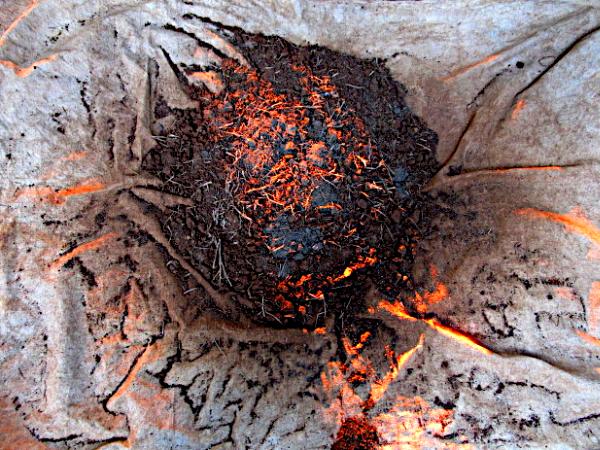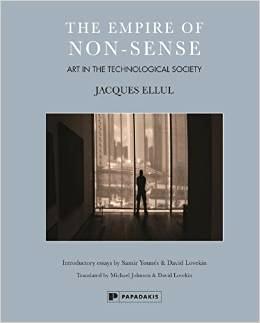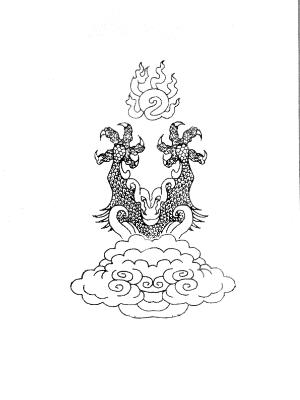Mythographer
Intellectual Appropriation, Mutilation, Recontextualization and Critique | | |
| 7/7/24 |
archaic, occult, and daemonic elements in modern art, 1914-1940
Surrealism is examined through its history and phenomenology. The frame
of reference is shifted from the history of art to the history of
religions; the premises of modern art historiography examined; and
Surrealism placed within an interdisciplinary context. The conjunction
between the Surreal and the sacred is developed through the
phenomenological clues of the uncanny, the weird, and the
irrational--popular perceptions of the Surreal. The Surreal is seen as
the transition between the ordinary and the extra-ordinary: as the
threshold of the sacred. The origins of the Surrealist impulse to
"transform life" are traced to occultism, alchemy, and hermetic
philosophy, that attempt to create "the union of opposites".
Historically, Surrealism stems from this heterodox tradition of archaic,
occult, and daemonic elements in European cultures, yet it radically
opposes them to the accepted religion and conventional mentality. In so
doing, Surrealism creates a new orientation based upon the power of
contradiction and ambivalence.
|
Be the first to post a comment.
|
4/6/23 |
Many modern artists and architects continue to imagine and build
the world technologically. Their beliefs remain firmly rooted in their
assumption that the liberating forces of technology freed them from
previous artistic traditions while making available vast means of
production and a plethora of materials. All artistic traditions were
seemingly put aside by the paintings of Cézanne, the poetry of
Baudelaire, and the architecture of Le Corbusier. Behind this
apparent freedom French critic Jacques Ellul, author of the classic The
Technological Society, found an absolute slavery. The artist was the
handmaiden of technology, a relation the artist no longer understood,
like other citizens of technological culture. Artists acclaimed their
unbridled individualism while being intensely determined by the forces
of technological culture. Ellul examines this process in modern
art from the beginning of the 20th century where the sense of art - its
meaning and embodiments - is reduced to non-sense. Ellul's study is in
the tradition of Guy Debord's The Society of Spectacle and Theodor
Adorno's Aesthetic Theory but moves significantly beyond their Marxist
perspectives that were, from Ellul's view, co-opted by technique.
|
Be the first to post a comment.
|
4/4/22Where is the shore that was previously here? All has shifted, and all is no more. The lines that are drawn have blurred and disappeared, grasping at air, in despair, wind torn and forlorn.
|
Be the first to post a comment.
|
6/26/21Historians of the Age
Look to the musty and vacant spaces of learning. The physical will always hold truth. The virtual is a lie.
|
Be the first to post a comment.
|
1/27/21
The past half-century has seen a steady erosion of trust in authority of all sorts,
ranging from a healthy scepticism to conspiracy theories, which say that governments
and their agencies or associates are capable of anything, even murder. To put it in
a more scholarly fashion,
conspiracy theories are “attempts to explain the ultimate cause of an event…as a
secret plot by a covert alliance of powerful individuals or organizations”. The phrase
conspiracy theories is often seen as pejorative and belief in them as irrational,
but researchers from the University of Kent, Canterbury, UK, are asking for more research
into “why people overtly reject conspiracy theories but privately accept them as true”.
For that is what we do, apparently.
|
Be the first to post a comment.
|
2/10/19"Once a contraption allowing the separation of technological capacity from moral imagination is put in place, it becomes self propelling, self reinforcing...the human capacity to adjust, habituate, become accustomed...will see to that. Atrocities in other words do not self condemn or self destruct. They self reproduce: what was once a shock degenerates into routine reflex." -Zygmunt Bauman
"The most profound radicalism is often the most profound conservatism" -T J Jackson Lear
"You must be a light to yourself! In a world that is rapidly growing dark." -J Krisnamurti
|
Be the first to post a comment.
|
| 1/31/18 "History doesn't repeat, but it surely rhymes."
-Mark Twain
"Most of the literature on the (concentration) camps has tended to stress the role of the camps as places of execution. Regrettably, few ethical or religious thinkers have paid attention to the highly significant political fact that the camps where in reality a new form of human society."
-R. L. Rubenstein, The Cunning of History.
"Problems in human engineering will receive the same genius the last century gave to engineering in more material forms."
-Thomas A. Edison
"If evolution cannot rationally be viewed as a way to get from ape-like creatures to man, then cannot the use of evolutionism as an ideological belief system get us from man to an ape-like creature? Such a capability would be of enormous value in politics."
-Peter Medawar, The Future of Man.
"You are being programmed."
-Chamath Palihapitiya, former facebook executive.
"In the midst of these long range trends - there was a lag in the recognition that a complex society demands a sophisticated understanding among all of its citizens."
-Michael Marien, The Discovery and Decline of the Ignorant Society.
"Historical developments in the 20th century have actually placed 'emergency powers' at the heart of the rule of law as a means of administering capitalist modernity."
-Mark Neocleous, The Problem with Normality.
"There is no more opportune moment for radical change than in the aftermath of a world catastrophe."
-Warren Wagar
"Human mobility will increasingly define the 21st century."
-Dimitris Auramopoulos
"Our world is headed into a perfect storm of an interconnected financial, ecological, and social crisis."
-Ian Johnson, Club of Rome.
"Utopian speculations...must come back into fashion. They are a way of affirming faith in the possibility of solving problems that seem at the moment insoluble. Today even the survival of humanity is a utopian hope."
-Norman O. Brown, Life against Death, 1959.
|
Be the first to post a comment.
|
10/15/16
"Television and the personal computer, even as they are now converging on a single machinic functioning ... are methods for the management of attention ... rendering bodies controllable and useful simultaneously, even as they simulate the illusion of choices and ‘interactivity’...the management of attention ... through the television set or computer monitor (at least in their overwhelmingly pervasive forms), has little to do with the visual contents of these screens and far more with a larger strategy of the individual ... with the construction of conditions that individuate, immobilize, and separate subjects, even within a world in which mobility and circulation are ubiquitous..."
-Jonathan Crary, Suspensions of perception: Attention, spectacle, and modern culture. Mit Press, 2001.
"The illusion of user control corresponds to the idea of contemporary identity as a continual performative task of self-construction. Culture today is made up of roles that must be continually reinvented – ‘chosen’ – rather than fixed identities...We are permeated with narcissism, not as self-love but in terms of the exclusive reference to ourselves, which asks: What does this event mean to me? The narcissistic subject searches for and expects ‘real’ and intense experiences only within the framework of their own needs and expectations...in which social relationships are treated as pretexts for the expression of personality..."
-Daniel Palmer, "The paradox of user control." Design Philosophy Papers 1.3 (2003): 127-135.
"The neo-Panoptic environment is a space where the destrucuration of trust isn't exercised by intimidation and refutation but by circulation and provocation, i.e., by the fact that deeply trusting relationships are never given the means, time or anonymous social space to thrive and develop. In control societies social-being mirrors the soft and immaterial forms of production that permeate a radically de-socialized/hypersocialized world of exchange - where 'interactivity' and 'inter-subjective relations' largely consist of the multiplication of light interactions, tertiary acquaintanships, and virtual transactions. Even sexual relations have be commuted into 'booty calls', FWB's, simulated pleasures and every other possible form of denatured touching."
-Grant Vetter, The architecture of control: a contribution to the critique of the science of apparatuses. John Hunt Publishing, 2012.
|
Be the first to post a comment.
|
11/10/15 "Naivete is often an
excuse for those who exercise power. For those upon whom that power is
exercised, naivete is always a mistake...History is the fruit of power,
but power itself is never so transparent that its analysis becomes
superflous. The ultimate mark of power may be its invisibility; the
ultimate challenge, the exposition of its roots."
― Michel-Rolph Trouillot
“In the universe, there are things that are known, and things that are unknown, and in between, there are doors.”
― William Blake
"The end of our
foundation is the knowledge of causes, and secret motions of things; and
the enlarging of the bounds of human empire, to the effecting of all
things possible."
― Francis Bacon, New Atlantis, 1627.
"With
Galileo, the desire to make his ideas prevail apparently led him to
report experiments that could not have been performed exactly as
described. Thus an ambiguous attitude toward data was present from the
very beginning of western experimental science. On the one hand,
experimental data was upheld as the ultimate arbiter of truth, on the
other hand, fact was subordinated to theory when necessary and even, if
it didn't fit, distorted."
- William J. Broad & Nicholas Wade, Betrayers of the truth: fraud and deciet in science
“This life's dim windows of the soul
Distorts the heavens from pole to pole
And leads you to believe a lie
When you see with, not through, the eye.”
― William Blake
"Friends, leave behind that darkened room
Where light of day is much abused,
And, bent low by crooked thought and gloom,
Our sight is anguished and confused..."
-Goethe, 'Murky Law' |
Be the first to post a comment.
|
Previously published:All 74 blog entries | Principiis Obsta (et respice finem) |  |
|